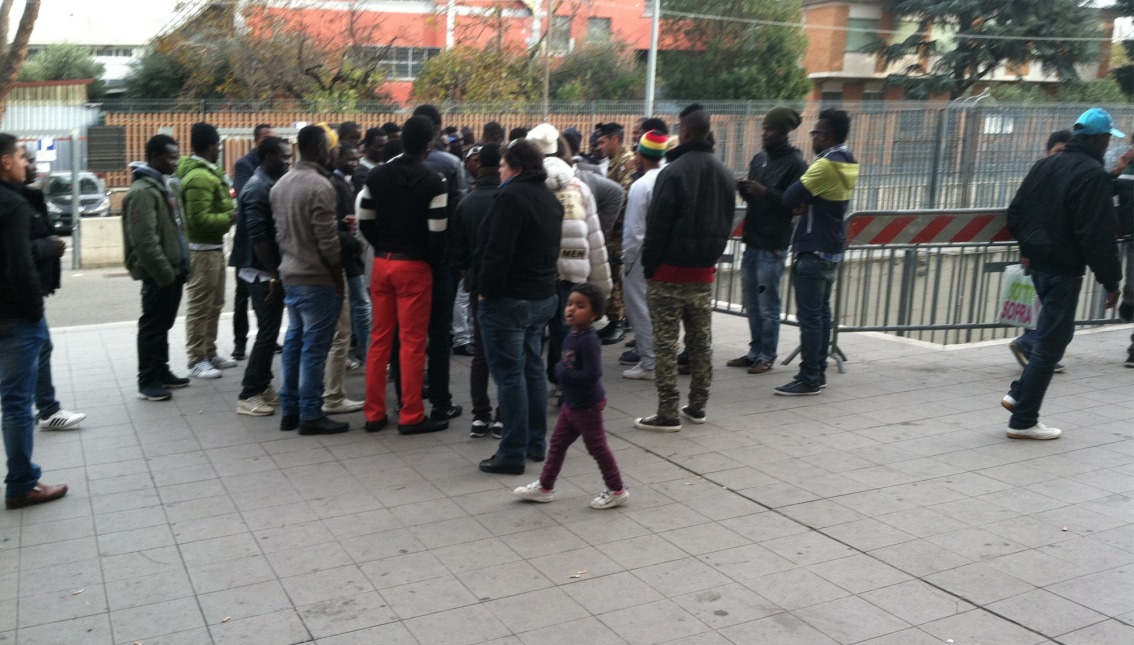
Fear of Ebola used to stoke anti-immigrant fears
MORE IN THIS SECTION
The route to Italy for refugees and migrants is a brutally hard one. Those coming from Africa and parts of the Middle East, like the Christians fleeing the civil wars in Syria and Iraq, must make their way to the lawless ports of Libya. Women and children are often victimized on the journey which can take weeks of hard travel through hardscrabble lands and war-ravaged communities. For those who make it, human traffickers charge a life’s savings to pack them like sardines onto dangerously unfit boats which, half sinking, half drifting, make their way to international waters. Once there, the traffickers disable the vessels completely, and all is left to chance. Will they be found and rescued before they die of thirst or the bucket goes down in a storm?
On the boat, there is no water or food. There are no bathrooms. There are no life rafts or life vests. Women refugees are told not to drink any liquids for a day or so before embarking so as not to have to urinate. The deck of the craft is packed till it can hold no more. Every surface is occupied by someone sitting or standing. These people are exposed to the elements, the sun and the wind and the rain and the cold of night. But this is far preferable to (and costs more than) down below. In the dark, airless holds, even the oxygen runs out, and the fumes from the ship’s engines can kill. Should the ship go down, there is no way out.
While some European countries refuse to rescue the migrants, turning the boats away, even at the risk of lives, Italy has adopted the policy of actively rescuing the migrants. The Italian navy actively intercepts these vessels. They attempt to identify and arrest any traffickers on board. The migrants are transferred onto a seaworthy crafts and taken to onshore refugee intake centers. The migrants are given a medical check-up as a routine part of the process. And it is precisely the issue of illnesses — or potential illnesses — borne by the refugees, in the shadow of the news over Ebola, that has caused a minor panic in the southern city of Palermo.
The trade union that represents the police officers of Palermo, Sicily, is in process of filing a class action lawsuit to force the government to upgrade and enforce stricter health protocols regarding the screening of diseases carried by refugees. Palermo immigration cops have been calling in sick, with an Italian version of the blue flu, last week, ever since the Ebola outbreak in West Africa began making headlines.
The Italian government argues that there is almost zero chance of this happening. It points out, quite reasonably, that the slow and arduous trek, first overland across Africa, and then over water across the sea, makes it highly unlikely someone infected with such a debilitating disease would pass unnoticed. They further point out that there are isolation rooms on the naval vessels, and initial screening at sea. Far more likely, experts say, if Ebola ever does reach Italy, it will arrive by air, not by sea.
But fears of real and imagined illnesses carried by migrants are being stoked by xenophobic political parties like the Northern League and their associated media. Publications and websites associated with anti-immigrant groups have published unsubstantiated claims that the number of cases of tuberculosis and scabies have risen sharply among police Italy since the operation to rescue sea migrants was launched. Government statistics do not show any such increases. Neither do any of the many non-profit agencies and volunteer organizations that work with refugees report any such issues.
But, for the political opponents of immigration, facts are trumped by fear and political gain. For the right, there is the conviction that there are votes to be had by stoking xenophobia. And nothing gets people’s attention more effectively, at the moment, than the word Ebola. It conjures a world of otherness and danger, and obscures reason.






LEAVE A COMMENT:
Join the discussion! Leave a comment.